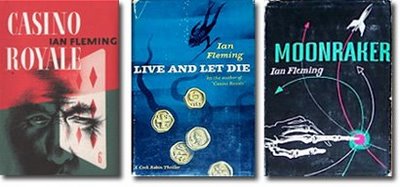Words by Revelator
Here is part 1 of 3 that we’re calling “the three ages of Bond.”
Thanks to Daniel Craig (and his underrated predecessor Timothy Dalton) we’ve heard a lot of the phrase “Fleming’s Bond,” as in “Craig comes closest to Fleming’s Bond, the ruthless government assassin” and so on. This phrase has always rang false to me, because Fleming’s version of the character was never fixed. “Fleming’s Bond” assumes that James Bond remained a static character, but Fleming lived with Bond for over a decade, during which his relationship with the character changed. There are several Bonds we could call “Fleming’s Bond”—the different versions of the character roughly correspond to the beginning, middle, and end of Fleming’s career as a novelist.
001. Blunt Instrument Bond (1953-1956)
Fleming’s original conception of Bond, the characterless government assassin: “The tough man of the world. The Secret Agent. The man who was only a silhouette.”
In Casino Royale Bond resembles a figure from hardboiled noir, either the American tradition of Chandler and Hammett or the continental versions of Peter Cheyney and Georges Simenon. OO7 is a tough-guy who kills because it’s his job. At one point Vesper feels
“thoroughly deflated by his harshness,” and recalls her boss’s warning that Bond is “a dedicated man…don’t imagine this is going to be any fun. He thinks of nothing but the job on hand and while it’s on, he’s absolute hell to work for…He’s a good-looking chap, but don’t fall for him. I don’t think he’s got much heart.”
Mathis understands this too; he tells Bond “Don’t let me down and become human yourself. We would hate to lose such a wonderful machine.”

This cold and brutal Bond is a far cry from the charmer of the movies, and many modern readers recoil from this Bond’s misogynistic utterances without realizing several are purposely intended to accentuate the harshness of Bond’s character, which will break down over the course of the novel. (Some of Bond’s nastiest remarks are clearly ironic–his infamous speech about “women who thought they could do a man’s work” is clearly at his own expense, since Vesper, far from being incompetent, actually arranged her own kidnapping and fooled him.) As Bond’s love for Vesper grows, we’re told that “Like all harsh, cold men, [Bond] was easily tipped over into sentiment.”
 Thanks to Vesper’s love and Le Chiffre causing him to question his job, Bond threatens to become human, until the final revelation of SMERSH’s role convinces Bond to remain “a wonderful machine.”
Thanks to Vesper’s love and Le Chiffre causing him to question his job, Bond threatens to become human, until the final revelation of SMERSH’s role convinces Bond to remain “a wonderful machine.”
That machine is the figure who stars in Live and Let Die, Moonraker, and Diamonds Are Forever, all carefully-controlled, procedural and mostly down-to-earth books.
He is the consummate professional, his character kept flat. Those who claim Bond has sense of humor likely have this incarnation in mind. While there is some personal growth—the Bond who rages about being assigned a female colleague in Casino Royale has no complaints about being paired with policewoman Gala Brand in Moonraker—it’s not until the final third of Diamonds Are Forever that Bond’s personality thaws, when he falls in love with Tiffany Case (perhaps Fleming’s best heroine).
As Bond grows increasingly considerate toward Tiffany’s emotions, he tells himself he will have to act like a therapist with her:
“He would be in the role of the healer, the analyst, to whom the patient had transferred her love and trust on her way out of the illness. There would be no cruelty equal to dropping her hand once he had taken it in his.”
At long last, Bond is threatening to become human again, leading to… Almost Human Bond (1957-1961)
Incidental Intelligence
The Three Ages of Bond: Part 2 – Almost Human Bond (1957-1961)
The Three Ages of Bond: Part 3 – Suffering Bond (1961-1964)
Dr. No – The Turning Point In Fleming’s Bond?
Talk of Goldfinger: From the Sublime to the Ridiculous
‘Live and Let Die’ and The Birth of the Classic Bond Narrative



Pingback: Five Reasons Why Idris Elba Should (Of Course) Be James Bond